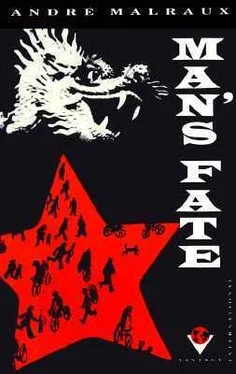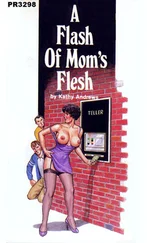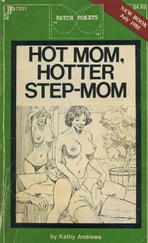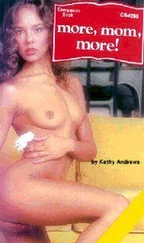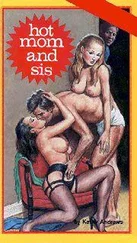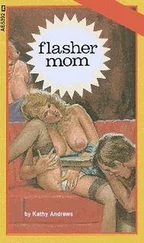He was not one of them. In spite of the murder, in spite of his presence. If he were to die today, he would die alone. For them everything was simple: they were $oing forth to conquer their bread and their dignity. For. he did not even know how to speak to them, except of their pain and of their common battle At least he knew that the strongest of bonds is battle. And the battle was here.
They got up, sacks on their backs, cans in their hands, wire under their arms. It was not yet raining; the gloom of this empty street which a dog crossed in two leaps, as if some instinct had warned him of what was impending, was as deep as the silence. Five shots went off in a nearby street: three together, another, still another. “It's starting," said Ch’en. The silence returned, but it no longer seemed to be the same. Suddenly it was filled by the clatter of horses’ hoofs, hurried, coming nearer and nearer. And, like the vertical laceration of lightning after a prolonged thunder, while they still saw nothing, a tumult suddenly filed the street, composed of mingled cries, shots, furious whinnyings, the falling of bodies; then, as the subsiding clamor was heavily choking under the indestructible silence, there rose a cry as of a dog howling lugubriously, cut short: a man with his throat slashed.
At a run they quickly reached a more important street. All the shops were closed. On the ground, three
1 A guaner of old Paris, between the rue Reaumur and rue du Caire; It served as a retreat for beggars, vagabonds and oudaws who 1iled the capital in the Middle Ages.
bodies; above, streaked with telegraph wires, the restless sky darkened by clouds of black smoke; at the end of the street, some twenty horsemen (there was very little cavalry at Shanghai) were turning hesitantly, not seeing the insurgents clinging to the wall with their instruments, their glance fixed on the hesitant movements of the horses. Ch'en could not think of attacking them: his men were too poorly armed. The insurgents turned to the right, finally reached a police station: the sentinels, without a word, followed Ch'en in.
The policemen were playing cards. Their guns and Mausers were in the rack. The non-commissioned officer in command opened a window, shouted into a dark court:
“All you who hear me are witness to the violence which is being done us. You see that we are obliged to yield to force!”
He was going to shut the window again; Ch’en held it open, looked: no one in the court. But appearances had been saved, and the theatrical gesture had been made at the right moment. Ch’en knew his compatriots: since this fellow was “playing the part,” he would not act. He distributed the arms among his men. The rioters left, all armed this time: useless to occupy the small disarmed police-stations. The policemen hesitated. Three got up and wanted to follow them. (Perhaps there would be plunder.) Ch'en had difficulty in getting rid of them. The others picked up the cards and went on play- mg.
“If they win,” said one, “perhaps we'll get paid this month?”
“Perhaps,” answered the non-commissioned officer. He dealt the cards.
“But if they’re beaten, perhaps we’ll be accused of treason.”
“What could we have done? We yielded to force. We are al witnesses that we did not betray.”
They were reflecting, their necks drawn in-cormorants crushed by thought.
“We are not responsible,” said one.
Al approved. They got up nevertheless and went to continue their game in a neighboring shop, the proprietor not daring to put them out. Only a pile of uniforms remained in the center of the station.
Elated and wary, Ch’en, followed by his men, was walking towards one of the central posts: “All is well,” he was thinking, “but those men are almost as poor as we. " The White Russians and the soldiers of the ^anored train would certainly fight. The officers too. Distant explosions, muffled as though the low sky had weakened them, were beating the air near the center of the city.
At a street-crossing, the troop-all the men anned now, even those carrying the cans-hesitated a moment, looked about. From the cruisers and the steamships unable to discharge their cargoes rose the oblique masses of smoke which the heavy wind scattered in the direction of the insurgents’ path, as if the sky were participating in the insurrection. The next station was an old red brick building, two stories high; there were two sentinels, one on each side of the door, bayonets fixed to their rifles. Ch’en knew that the special police had been on the alert for three days, and that their men were worn out by the uninterrupted vigil. There were officers here, some fifty Mauserists of the police-well paid-and ten soldiers. To live, to Jive at least through the next week! Ch’en had stopped at the comer of the street. The arms were no doubt in the racks on the ground-floor, in the right-hand room, the guard-room, which led to the office of an officer; Ch’en and two of his men had gone in there several times during the week. He chose ten men without guns, made them hide the revolvers in their blouses, and advanced with them. Once beyond the corner, the sentinels watched them approach. As they were suspicious of everyone, they had ceased to be suspicious of anyone in particular; workers’ delegations often came to parley with the officer, usually to bring him tips, an operation which required many guarantees and persons.
“To see Lieutenant Sui T’un,” said Ch’en.
While eight men were passing, the two last, as if pushed in the slight shuffle, slipped between the sentinels and the wall. By the time the first ones were in the hall, the sentinels felt the muzzles of revolvers in their sides. They let themselves be disarmed: they were better paid than their wretched fellow-policemen, but not sufficiently to risk their lives. Four of Ch’en’s men who had not joined the first group and who seemed to be passing in the street, led them away along the wall. Nothing had been visible from the windows.
From the hall Ch’en could see the racks filled with rifles. In the guard-room there were only six policemen armed with automatics, and those weapons were on their belts, in closed holsters. He threw himself in front of the racks, revolver held out.
If the police had been resolute, the attack would have failed. In spite of his detailed acquaintance with the places where he was to operate, Ch’en had not had time to designate to each of his men the one he was to cover with his gun; one or two of the police could have fired.
But all put up their hands. They were immediately disarmed. A new group of Ch’en’s men entered. A new distribution of arms began.
“At this moment,” Ch’en was thinking, “two hundred groups in the city are doing what we are doing. If they all have as good luck. " Hardly had he taken the third gun when he heard the sound of a headlong dash coming from the stairway: someone was running up the stairs. He went out. The moment he passed the doorway a shot was fired from the floor above. Nothing more at the head of the stairs. One of the officers, upon coming down, had seen the insurgents, fired, and immediately regained the second story.
The fighting was about to begin.
A door, in the center of the second-story landing, commanded the stairway. Send a spokesman, Asiatic- fashion? Ch’en hated all the Chinese good sense which he recognized in himself. Attempt to take the stairs by force? — as well commit suicide: the police no doubt had a supply of hand-grenades. The instructions of the military committee, transmitted by Kyo to all the groups, were to set fire in case of partial failure, to take position in the adjoining buildings, and to caU the special squads for help. There was nothing else to do.
“Set fire!"
The men with the cans tried to pour out the oil in splashes like water out of a bucket, but the narrow openings only squirted derisive little jets. They were obliged to pour it slowly, on the furniture, along the walls. Ch’en looked through the window: opposite, closed shops, narrow windows commanding the exit from the station; above, the rotten curled-up roofs of Chinese houses, and the infinite calm of the gray sky now no longer streaked with smoke, of the intimate low sky on the empty street.
Читать дальше
